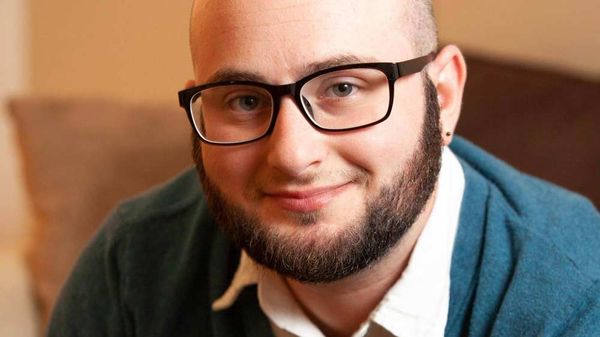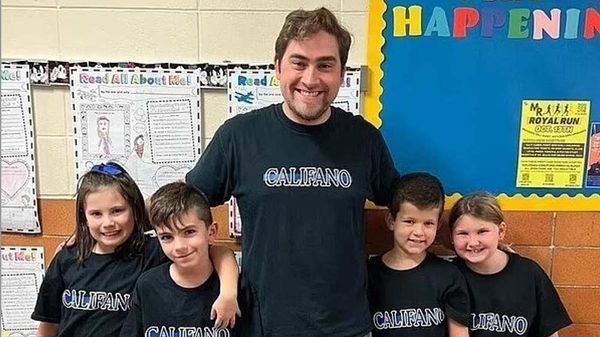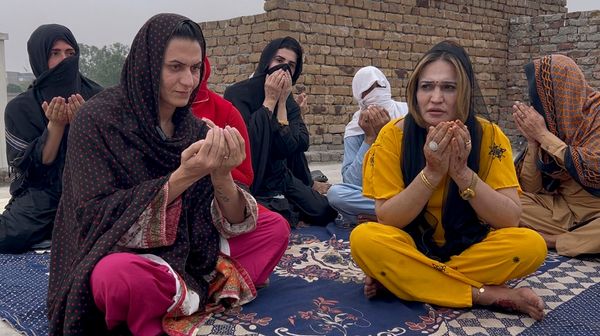May 8, 2008
Taking educators to school
Michael Wood READ TIME: 11 MIN.
Wakefield High School was a war zone for Diane Difraia. She preferred sweats and t-shirts to hip-huggers and girly tops. On the athletic field she was so aggressive her coaches told her to play with the boys. In tenth grade Difraia came out as a lesbian to her family and close friends, but asked that they keep it a secret. But word somehow got out. In English class girls began calling her names and directing anti-gay slurs at her behind the teacher's back. To this day Difraia, now 20 and a senior at Suffolk University, does not know if any of her friends told her secret or if students drew their own conclusions. But she knows how the rumors about her being a lesbian spread: through the power of the Internet.
"About two weeks into school a website was published on a Facebook, MySpace type of thing outing me," said Difraia, who said she does not know who created the page. "They created a site saying I was a lesbian, had tons of pictures on it, [and they] Photoshopped some of them. I don't even know how they got all the pictures. ... Then in school I was in my English class and I think the third week, or fourth week, the people in my class started making fun of me, saying names. All the girls in class started saying stuff."
When she complained Difraia said the teacher reprimanded the harassers and gave them detention. But the harassment only escalated as the school year wore on. Difraia said girls would continue to harass and taunt her in and out of class, and boys asked her lewd questions about the mechanics of lesbian sex. Soon the attacks turned physical, and they took their toll.
"If I was outside they'd push me, shove me. If I was by myself people would try to get near me and do stuff. As time went on I was very much depressed. I was suicidal at home because I was trying to figure out what was going on," said Difraia. On the home front her parents were supportive, which is not surprising given that Difraia grew up with two moms. But Difraia's outing coincided with her parents' divorce, and she said they did not know the full extent of the harassment. But the mother with whom she lived knew that something was wrong when Difraia began skipping school. Difraia racked up more than 100 absences, and officials called her and her mother in to discuss the situation. Difraia said she and her mother asked the school to step in and take action against the harassers, but school officials told them there was little they could do. (Wakefield High Principal Elinor Freedman did not return a call to comment for this story.)
Rather than fight things out at Wakefield High Difraia and her mother made a plan to allow her to graduate early by taking her GED and the MCAS, and she left in the spring of 2004. Yet even after she left the school the trauma of the daily harassment haunted her. During the first day of orientation at Suffolk she heard other incoming students using phrases like, "That's so gay," and she panicked. Difraia, who now identifies as genderqueer, left orientation that evening wondering whether she would be able to cope with being in a large environment with her peers.
"I wasn't really ready to be submerged in with tons of students again. I was still very shy around groups of people, I was very standoffish and very, 'Can I talk? Can I not talk? Can I express who I am?' It was very much for me trying to get oriented back into school life," said Difraia.
Stories like Difraia's rarely make headlines these days in Massachusetts. Last November the Boston Globe Sunday Magazine published a cover story on LGBT teens that painted a rosy picture of young people coming out and facing little resistance at school or on the home front. It's hard to dispute that life for LGBT young people as a whole is better than it was even five or ten years ago, but the Globe article only told part of the story. On May 10 thousands of youth are expected to gather on Boston Common for the 15th annual Youth Pride, where they will parade through the streets behind bright rainbow banners and hear speakers talk triumphantly about working in their schools to create a more LGBT-friendly climate. But for many of these youth bullying and harassment are still regular occurrences, and young people who are transgender or otherwise gender variant often face added burdens.
"Trans youth are often, especially gender-variant youth, often more visible, and more visible or not, when their identities are known it's far less understood and therefore they're far more likely" to be targeted by bullies, said Grace Sterling Stowell, executive director of the Boston Alliance of GLBT Youth (BAGLY). Beyond harassment from peers, trans and gender-variant youth also often face the additional challenge of convincing school officials to support their gender identity by referring to them by a new name and gender appropriate pronouns, allowing them to wear clothes that match their gender identity, and making accommodations for gender-appropriate bathrooms and locker facilities.
As far as the scope of the problems transgender youth face, all youth advocates have to go on is anecdotal evidence. For years the Department of Public Health has collected reams of data on the health and safety risks faced by gay, lesbian and bisexual youth through the Youth Risk Behavior Survey (YRBS), conducted at public schools across the Commonwealth every two years. The survey has shown the disproportionate rates of suicide attempts, drug use, skipped school, violence and harassment faced by GLB youth, and it has shown those rates dropping over the years. But the YRBS contains no questions about gender identity or expression, meaning there is precious little data about the lives of transgender youth and the risks they face.
Stowell said from her experience working with youth at BAGLY there are a handful of schools around the state that have taken steps to create a safe environment for transgender students, but they are the exception to the rule.
"There's a much broader group that are not actively hostile but have little experience or understanding and don't know how to handle it," said Stowell. "And there's another hopefully smaller group of schools where ... they're not interested in doing the right thing. They're interested in making the problem go away."
How soon is now?For the past couple of years Jaysin Gordon, a junior at Dearborn Academy in Arlington, identified among his close friends as FTM, but when it came to the wider school community he largely kept mum. Gordon, who lives with his grandmother, said that because she did not initially support his decision to transition he decided to wait to come out more publicly until after he turned 18. This past October he said he approached the administration and told them his plan to come out. He asked them to support him by putting the word out to teachers and students that he now wanted to be called Jaysin and referred to with masculine pronouns. But he said while school officials were initially supportive, they did not set an immediate plan to formally acknowledge his gender change.
"I decided to come out, and I came out, and they took it pretty good at first, and they had a week to think about it, and then they called and said, 'Give us a week,' and a week turned into a month, and a month turned into now," said Gordon, in an interview at the end of April. Just one week later Gordon notified Bay Windows that school officials had implemented the change. He was grateful for the decision, but he still felt that the months that went by between his request and implementation were far too long.
"The time it took is ridiculously long, but they are supporting it at this time. ...I'm definitely going to want to be there. Because when they don't respect you, you don't really want to be there. I'm going to be at school more and want to be there and get the education I'm going to get because of that," said Gordon.
Howard Rossman, director of Dearborn Academy, which serves youth with emotional, behavioral or learning difficulties, said that he and other administrators involved in the decision to support Gordon's transition felt it was important to take things slowly and make sure there was a clear process to help Gordon and the school community navigate the gender change.
"It's not something [Gordon] had been discussing with counseling, so whatever issues students bring to us we try to be really cautious ... making sure that we're dealing with whatever issues they bring to us in depth. Given the fact that he hadn't been discussing it in counseling, we thought we should slow the process down," said Rossman.
Dearborn consulted with Adam Glick, a therapist at Beacon High School in Brookline and a board member of the Gay, Lesbian and Straight Education Network (GLSEN) of Boston, who agreed that the school should work with Gordon to create a process to ensure that both he and the school were prepared. Glick and veteran safe schools trainer Kim Westheimer came in to do a staff training back in February, and Gordon's clinician worked with him to talk about his plans to transition and his gender identity.
The process was delayed by several months when Gordon left home in November and lived on his own in Southbridge, going to Southbridge High School until he returned home in January. While Gordon said there were a number of reasons why he left home, many of them unrelated to his gender identity, one of the main sources of conflict with his grandmother was over his dissatisfaction with the process of formally changing his gender at school. Gordon said without the official word from administrators most of his teachers referred to him by his birth name and referred to him using female pronouns, which left him feeling frustrated and unhappy.
"I wasn't happy at school so I wasn't happy anywhere else. ... I didn't give up, because I definitely kept fighting for what I wanted, but it was really hard when they weren't helping," said Gordon.
Rossman said the school was working to help him, but that administrators wanted to make sure that both Gordon and the school were prepared for the transition.
"But I can understand how he'd feel that way. It's just a matter of trying to do the best thing for the kids. ... I know he was frustrated. When he first brought it up he wanted us to implement the change immediately, and we all felt it was a little too quick," said Rossman.
Glick, who said he was unfamiliar with the details of Gordon's situation, said that in general schools working with a student who wants to change gender should create a formal process to guide both the school and the student through the situation.
"I think one thing I recommend is they make sure there's some process, because it is a very deep and intense thing that people have often thought about for a long time, and it's really different than a kid asking for a new nickname. ... It's really symbolically an important issue, and to be taken with some importance - we as a school are ready to make this change, and we understand what this means," said Glick.
There is no one-size-fits-all approach to designing a process, said Glick. His own school has had several students identify as transgender, so the administration has ample experience to draw on when a student asks to be allowed to change their name and gender at school. This year Glick said the school was able to accommodate one incoming student's request to change his name and pronouns within days. At schools that have no experience dealing with transgender youth - such as Dearborn - the process can take longer.
But Glick also said schools should balance their need for a formal process with the student's sense of urgency.
"I find sometimes when I go into schools, I end up trying to help them feel more confident in moving it along quicker. Because a lot of times schools with very good intentions feel, 'We don't know enough.' ... They worry they can't do right by the kid, and they're afraid to move forward," said Glick.
Andrea Razi, an Arlington therapist who specializes in working with transgender youth, said that when a school is working to accommodate a transgender student's transition it can often be a slow process, and the larger the school, the longer it takes for administrators to do the education needed to ensure the youth's safety. But in the interim she said school officials should keep the young person in the loop, and they should also make sure that the student feels validated in their identity even before the school formally recognizes their gender change.
"I think the student should be allowed to talk openly about their identity with any teacher or student," said Razi, who is also an intervention coordinator at Arlington High School.
While the extended process of formally changing his gender within the school was a major source of frustration, Gordon said he encountered few problems dealing with his peers as an out FTM. He said students have asked him questions about transgender identity, but none have harassed him. And he said his friends have remained supportive throughout the process.
"My friends at school are cool with it, but they don't know much about it. They're not very informed about trans issues or trans anything, other than that they're my friend and they respect me," said Gordon.
He also had support in the form of a handful of teachers who embraced his decision to transition, as well as support from groups off campus. Since he was 14 years old he has been going to the Boston Alliance of GLBT Youth (BAGLY), where he now serves on the youth leadership committee. He said BAGLY gave him the opportunity to connect with other youth dealing with gender identity issues, and it also served as a crucial forum to vent his frustrations about the transition process at school and other issues.
Last March Gordon found another source of support, the Massachusetts Transgender Political Coalition (MTPC). Gordon attended the March hearing on the transgender non-discrimination and hate crimes bill, House Bill 1722, and "fell in love with MTPC." He has since become an intern with the advocacy group.
"If I didn't have the support group I had, I don't know how I would be doing this. I'd be lost," said Gordon.
Since moving back home Gordon said his grandmother has also worked to be supportive, despite their disagreements.
"She tries her hardest to be supportive, and she's doing a great job," said Gordon.
Finding support
Finding supportive allies was also a crucial step for Difraia when she left high school and entered Suffolk. During her freshman year she began questioning her gender identity, and again found herself the target of harassment because of her masculine appearance. Difraia lived at the home of one of her parents, but while on campus she stopped using the bathroom after multiple instances of being harassed and told she was in the wrong bathroom.
In the spring of her freshman year Difraia attended her first BAGLY meeting. It was the first time she was surrounded by supportive youth allies. She walked through the door while BAGLY's youth committee was holding elections, and was encouraged on the spot to run for the position of welcoming coordinator. Difraia won and has been a regular member of the group ever since.
BAGLY also helped connect her to MTPC. In talking with MTPC director Gunner Scott she began to come out again, this time as transgender.
"I was starting to notice when people called me 'she' or 'girl,' inside I was just, 'No, that's not who I am.'... I was getting really angry but not showing it or really telling people, 'No, I feel uncomfortable when you say that.' I didn't know," said Difraia. "I knew about transgender and I was just like, 'That isn't me.' But I never knew that gender identity and genderqueer and all this other stuff fall under that category until I met Gunner, which was probably this year."
Difraia said finding a group of peers at BAGLY has been vital to feeling more secure. She wishes she had found them during her high school years.
"That's when I noticed a big change because I had a support group. I had people I could go talk to if I had an issue or [needed] advice, [to ask] what should I do in this situation?" said Difraia.
Michael Wood is a contributor and Editorial Assistant for EDGE Publications.







